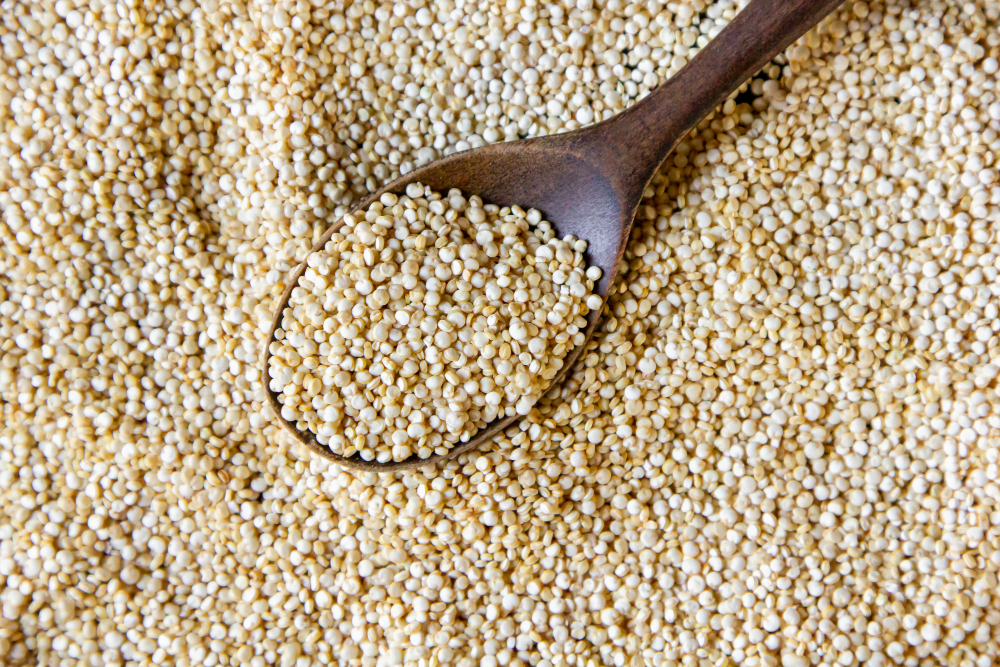Amaranth stands as a very valuable ancestral product that has captivated civilizations throughout the centuries as a nutritious and healthy seed. Originally from Central America and Mexico, this plant has been appreciated for its nutritional richness. But it has also been recognized for its therapeutic properties and its versatility in cooking and cosmetics.
Amaranth Seed Nutritional Composition
Amaranth seed, scientifically known as Amaranthus spp. is a true nutritional powerhouse. Rich in high quality protein, it contains all the essential amino acids needed by the human body. In addition, it is an excellent source of dietary fiber, vitamins such as vitamin C, E, and B complex, as well as key minerals such as iron, calcium, magnesium and phosphorus. This unique combination of nutrients makes it an ideal food for promoting overall health and wellness . Here are the key components that make Amaranth such a nutritious food:
High Quality Protein: Amaranth is unique among grains for its exceptionally high protein content. It contains about 14 to 18% protein, with a remarkable abundance of lysine, an essential amino acid that is often deficient in other grains. This combination of essential and non-essential amino acids makes it an excellent source of complete protein, comparable to that of eggs or milk.
Dietary Fiber: Amaranth seed is rich in dietary fiber, with approximately 6-10% of its weight composed of fiber. This fiber is of utmost importance for digestive health, as it promotes bowel regularity and prevents constipation. But, it also helps maintain healthy cholesterol and blood sugar levels.

Vitamins, essential minerals and other nutrients in amaranth
Vitamins: Amaranth contains a wide range of vitamins essential for optimal body function. Among the vitamins present in amaranth are vitamin C, a powerful antioxidant that supports the immune system and skin health. Also vitamin E, which protects against free radical damage. It also has several B vitamins, including thiamin (B1), riboflavin (B2), niacin (B3), pantothenic acid (B5) and folic acid (B9). All of these vitamins play key roles in energy metabolism and nerve function.
Essential Minerals: Amaranth is an excellent source of essential minerals for bone, muscle and cardiovascular health. Highlights:
- calcium, essential for healthy bones and teeth;
- iron, necessary for hemoglobin formation and oxygen transport in the blood;
- magnesium, which contributes to muscle and nerve function; and
- phosphorus, which is involved in the formation of DNA and bones, as well as in the production of cellular energy.
Other Beneficial Nutrients: In addition to the nutrients mentioned above, amaranth contains a variety of bioactive compounds beneficial to health, such as:
- phytosterols, which may help reduce cholesterol;
- flavonoids, with antioxidant and anti-inflammatory properties; and
- lignans, which may have protective effects against certain types of cancer.
Therapeutic properties of amaranth, a nutritious and healthy seed.
Amaranth has been valued for centuries for its therapeutic properties. It has been shown that its regular consumption can help reduce cholesterol, control blood sugar levels and promote cardiovascular health. In addition, its iron content makes it a powerful ally in the fight against anemia. Moreover, its high antioxidant content helps fight oxidative stress and strengthen the immune system.

How amaranth is consumed
One of the most fascinating qualities of amaranth is its versatility in the kitchen. Amaranth seeds can be cooked as cereals, added to salads, soups or stews. They can also be ground into flour to make breads, cookies or tortillas. But in addition, they can be puffed up like popcorn for a healthy , crunchy snack. The young leaves of the amaranth plant are also edible and can be used in salads or stir-fries.
But it should also be noted that the introduction of these cereals in a gluten-free diet for people suffering from celiac disease is one of their most interesting applications. This brings a little diversity to the celiac diet, sometimes very limited, and makes it possible to benefit from their nutritional properties.
Uses of amaranth in the food and cosmetic industry
In the food industry, amaranth seeds are used to make baked goods, cereal bars, breakfast cereals and pasta, adding a nutritional boost to these foods. In addition, amaranth oil has earned a place in cosmetics for its moisturizing and rejuvenating properties.
But it is also commonly found in skin and hair care products, offering nutritional and antioxidant benefits.
Amaranth is a seed valued for being nutritious and healthy, but especially because it is much more than a seed. It is an exceptionally nutritious and versatile food, suitable for promoting health and wellness. Incorporating amaranth into the daily diet can be an effective way to increase the intake of essential nutrients. But it also allows you to enjoy its numerous health benefits.
Amaranth is part of Qomer' s product catalog, where you can learn more about this product. We remain at your disposal to provide you with more information.
Credits: Qomer and FreePick photos